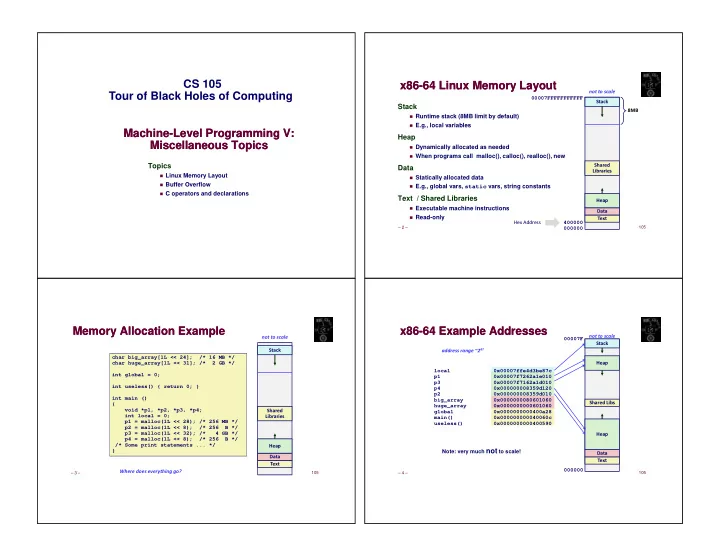

✁ ✁ ✁ ✁ ✁ ✁ ✁ ✁ ✁ ✁ ✁ ✂ ✁ CS 105 x86-64 Linux Memory Layout x86-64 Linux Memory Layout Tour of Black Holes of Computing ������������ 00007FFFFFFFFFFF ����� Stack ��� Runtime stack (8MB limit by default) E.g., local variables Machine-Level Programming V: Machine-Level Programming V: Heap Miscellaneous Topics Miscellaneous Topics Dynamically allocated as needed When programs call malloc(), calloc(), realloc(), new Topics Data ������ ��������� Linux Memory Layout Statically allocated data Buffer Overflow E.g., global vars, static vars, string constants C operators and declarations Text / Shared Libraries ���� Executable machine instructions ���� Read-only ���� 400000 ����������� 000000 105 – 2 – Memory Allocation Example Memory Allocation Example x86-64 Example Addresses x86-64 Example Addresses 00007F ������������ ������������ ����� ����� ���������������� char big_array[1L << 24]; /* 16 MB */ char huge_array[1L << 31]; /* 2 GB */ ���� local 0x00007ffe4d3be87c int global = 0; p1 0x00007f7262a1e010 p3 0x00007f7162a1d010 int useless() { return 0; } p4 0x000000008359d120 p2 0x000000008359d010 int main () big_array 0x0000000080601060 { ����������� huge_array 0x0000000000601060 void *p1, *p2, *p3, *p4; global 0x0000000000400a28 ������ int local = 0; main() 0x000000000040060c ��������� p1 = malloc(1L << 28); /* 256 MB */ useless() 0x0000000000400590 p2 = malloc(1L << 8); /* 256 B */ p3 = malloc(1L << 32); /* 4 GB */ ���� p4 = malloc(1L << 8); /* 256 B */ /* Some print statements ... */ ���� } Note: very much not to scale! ���� ���� ���� ���� 000000 105 105 – 3 – ������������������������� – 4 –
✁ ✁ ✁ ✁ ✁ ✁ ✁ ✁ Carnegie Mellon Carnegie Mellon Memory-Referencing Bug Example Memory-Referencing Bug Example Memory-Referencing Bug Example Memory-Referencing Bug Example typedef struct { /* An "anonymous" structure */ typedef struct { fun(0) � 3.14 int a[2]; int a[2]; fun(1) � 3.14 double d; double d; } struct_t; } struct_t; /* "typedef" gives it a type name */ fun(2) � 3.1399998664856 fun(3) � 2.00000061035156 double fun(int i) fun(4) � 3.14 { volatile struct_t s; fun(6) � ������������������ s.d = 3.14; s.a[i] = 1073741824; /* 2**30, possibly out of bounds */ ������������ return s.d; } �������������� �� ? �� fun(0) � 3.14 ? �� fun(1) � 3.14 ��������������������� fun(i) d7 ... d4 fun(2) � 3.1399998664856 � fun(3) � 2.00000061035156 d3 ... d0 � struct_t ���������������������������� fun(4) � 3.14 a[1] � fun(6) � ������������������ ��������������������� a[0] Result is system-specific � 105 105 – 5 – – 6 – Such problems are a BIG deal Such problems are a BIG deal String Library Code String Library Code Implementation of Unix function gets() Generally called a “buffer overflow” When exceeding the memory size allocated for an array /* Get string from stdin */ char *gets(char *dest) Why a big deal? { int c = getchar(); It’s the #1 technical cause of security vulnerabilities char *p = dest; � #1 overall cause is social engineering / user ignorance while (c != EOF && c != '\n') { *p++ = c; Most common form c = getchar(); } Unchecked lengths on string inputs *p = '\0'; Particularly for bounded character arrays on the stack return dest; } � Sometimes referred to as “stack smashing” No way to specify limit on number of characters to read Similar problems with other library functions strcpy , strcat : Copy strings of arbitrary length scanf , fscanf , sscanf , when given %s conversion specification 105 105 – 7 – – 8 –
Vulnerable Buffer Code Vulnerable Buffer Code Buffer Overflow Disassembly Buffer Overflow Disassembly /* Echo Line */ ����� void echo() 00000000004006cf <echo>: { 4006cf: 48 83 ec 18 sub $0x18,%rsp char buf[4]; /* Way too small! */ � ������������� gets(buf); 4006d3: 48 89 e7 mov %rsp,%rdi �������������� puts(buf); 4006d6: e8 a5 ff ff ff callq 400680 <gets> } 4006db: 48 89 e7 mov %rsp,%rdi 4006de: e8 3d fe ff ff callq 400520 <puts@plt> 4006e3: 48 83 c4 18 add $0x18,%rsp void call_echo() { echo(); 4006e7: c3 retq } unix> ./bufdemo Type a string: 012345678901234567890123 ���������� 012345678901234567890123 4006e8: 48 83 ec 08 sub $0x8,%rsp 4006ec: b8 00 00 00 00 mov $0x0,%eax unix>./bufdemo 4006f1: e8 d9 ff ff ff callq 4006cf <echo> Type a string: 0123456789012345678901234 4006f6: 48 83 c4 08 add $0x8,%rsp Segmentation Fault 4006fa: c3 retq 105 105 – 9 – – 10 – Buffer Overflow Stack Buffer Overflow Stack Buffer Overflow Stack Example Buffer Overflow Stack Example ������������������� ������������������� void echo() echo: { subq $24, %rsp ����������� ����������� ���� call_echo ���� call_echo char buf[4]; movq %rsp, %rdi gets(buf); call gets . . . . . . /* Echo Line */ } 00 00 00 00 void echo() �������������� �������������� { 00 40 06 f6 ��������� ��������� char buf[4]; /* Way too small! */ ���������� gets(buf); puts(buf); . . . } 4006f1: callq 4006cf <echo> ��������������� ��������������� 4006f6: add $0x8,%rsp . . . [3] [2] [1] [0] buf %rsp [3] [2] [1] [0] buf %rsp echo: subq $24, %rsp movq %rsp, %rdi call gets . . . 105 105 – 11 – – 12 –
Recommend
More recommend